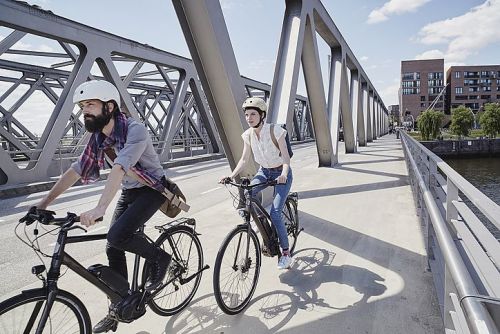WASHINGTON (BRAIN) — While Congress continues to debate the reconciliation bill that includes making e-bikes more affordable and bike commuting safer, two bicycle organizations are asking for the industry's help after the e-bike tax credit was cut in half Wednesday by the House Ways and Means Committee.
PeopleForBikes and The League of American Bicyclists encourage contacting congressional representatives to support the following programs and urge them not to downsize them further.
- E-bike tax credit: 15% on the purchase of new e-bikes (the first $5,000), up to $750 benefit value. The credit was originally proposed for 30%.
- Bicycle commuter benefit: Allow use of pre-tax dollars to fund bike purchases and bike-share memberships.
- E-bikes for business tax credit: An incentive of a tax credit of 30% for businesses to install e-bike charging stations.
- Funding to reconnect or enhance communities split apart by highway projects.
- Opportunities to build a sustainable and complete bicycle network.
The bill now goes to the House Budget Committee.
"While we had hoped for a larger benefit, we appreciate that the e-bike benefit made it into the bill and that it is strongly weighted to low- and middle-income families," said Caron Whitaker, League of American Bicyclists deputy executive director. "The price of the e-bike benefit is $7.4 billion over 10 years — versus $15.6 billion for electric cars — so Congress is projecting huge e-bike sales. That means e-bikes can play a critical role in reducing climate change, providing affordable transportation options, and keeping Americans active longer."
The organizations say the e-bike and bike commuting tax incentives will go a long way toward getting more people to commute by bike and thereby lowering carbon emissions. Enhancing infrastructure to build connected bike lanes and recreational trails goes hand-in-hand to make commuting safer.
The House's Build Back Better Act — formerly the GREEN Act — proposes $7.4 billion for e-bike tax credit over 10 years. It also would establish an $81 a month pre-tax benefit for biking to work that could be used with parking and transit and bike share, micromobility and e-bike costs.
"Every dollar invested in bicycle incentives guarantees returns for a cleaner planet, better public health, equitable mobility, and economic growth," said PeopleForBikes President and CEO Jenn Dice. "When so many of us are re-evaluating how we move and the climate impact of our transportation choices, the Build Back Better Act will help bring electric bicycles into the homes of Americans seeking an efficient and emissionless transportation option."
The Senate's similar e-bike tax credit bill — Electric Bicycle Incentive Kickstart for the Environment (E-BIKE) Act — was introduced in July. According to Noa Banayan, PFB director of federal affairs, the Senate could make "modest changes" to the tax credit and adopt the House changes.
"The Ways and Means Committee in the House of Representatives took a monumental $7.4 billion first step toward establishing an electric bicycle tax credit," Banayan said. "This level of proposed investment in electric bicycles is a testament to their growth and unique ability to replace short car trips and significantly lower carbon emissions in the United States. PeopleForBikes is committed to working with leaders in the House and Senate to advance an electric bicycle tax credit and a bicycle commuter benefit in the budget reconciliation process."
The Ways and Means Committee's bill includes an allowance for taxpayers to claim credit for one e-bike per taxable year — two for joint filers — beginning in 2022. The credit would phase out "starting at $75,000 of modified adjusted gross income ($112,500 for heads of household and $150,000 for married filing jointly) at a rate of $200 per $1,000 of additional income. For a given taxable year, the taxpayer may use modified adjusted gross income for that year or the immediately preceding year, whichever is lower."
The committee also said that to be eligible, the aggregate amount paid for the e-bike can't exceed $8,000, and e-bike manufacturers have to assign a "qualified vehicle identification number," and the e-bike owner has to provide that to receive the tax credit. According to PeopleForBikes, a qualified vehicle identification number would not designate e-bikes as motorized vehicles.


